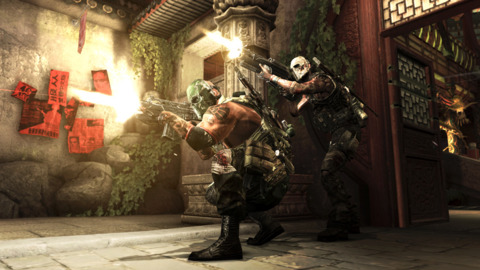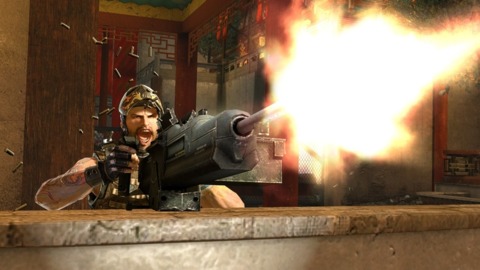
The game is built to point you directly at the action. Though you'll get a little bit of radio chatter as the two mercenaries talk with their handler and a few other characters, the story--the reason why Shanghai is getting blasted apart--is mostly relegated to the pause menu. Once paused, you can dig out some radio recordings that are collected along the way to sort of piece together the identity the game's lead villain and maybe even a few of his motivations. Considering how poorly justified the game's activities are by those recordings, maybe it's for the best that they take a back seat to the shooting. Still, the game opens with what could have been a great hook--the absolute destruction of Shanghai. Buildings all across the skyline are ripped apart, if not by bombs, then by helicopters or planes crashing into them. The first chapter sets up some incredible-looking chaos, but there's no followthrough. Once the initial destruction is over with, the game's environments just look like any other war-torn part of the world. By the end of the game, when you finally confront the man responsible for the attack, you won't even be sure why you want to stop him so badly. Heck, I managed to get through something like 98 percent of the game without even learning the guy's name.
In what must have been an attempt to humanize the characters of Salem and Rios a bit, the game presents you with one moral quandary per chapter. It starts when your initial contact for your first mission turns out to be on your shadowy employer's hit list. Do you kill the guy that helped you get through the early part of the game for a little extra cash, or have you become attached to him in the game's first five or ten minutes? When these moments hit, you're given two button presses that choose which moral path you'll take. After that, the game cuts to a series of static, comic book-like images that extrapolate your actions into some sort of eventual conclusion. In the above example, killing the guy shows a few shots of his face and his ID, attempting to drive the point home that you killed a man after you've just spent the last few minutes gunning down plenty of other men. If you let him live, the sequence shows your new best friend sitting on a beach... where he's killed by an assassin. The "good guy" choices too often end with this sort of "oh, well, he died anyway" or "the person you thought you saved was a bad person" twist, which makes the whole system a little ugly because it's constantly hitting you over the head with the notion that no choice is the right choice.

While the aggro system works as intended, it's rarely a necessity. As you upgrade your firepower to bigger and better rifles, you'll be taking down the basic enemies with only a few shots. The guns feel overpowered, and as a result it's far easier to just take cover and eliminate every enemy in range with short bursts of assault rifle fire than it is to set up a situation where one player draws attention while the other slips around the side. The exception is that you'll occasionally face heavily armored enemies that need to be shot in the back.
Though the seven-chapter campaign is certainly better with a live human controlling your partner, the game can, of course, be played alone. When doing so, you'll be able to give a few orders to your partner, which lets you control when he'll advance, when he'll stick by your side, and when he'll stop and take cover. This lets you order your partner to sit still and lay down enough cover fire to give you a chance to run around, plinking enemies off one by one. In the event that you get dropped by the opposition, your partner can drag you to safety and shoot you full of life-giving drugs, which get you back up on your feet immediately. The dragging controls are a little off, and when you're playing with an AI-controlled partner, he never seems too clear on the concept of dragging you to safety before attempting to heal you. This results in a lot of dumb, preventable deaths when playing alone. This was a problem in the first game, too, and it's sort of surprising that it hasn't been addressed.
In addition to the campaign, there are also a few different multiplayer modes. Extraction--a "bonus" mode that will only be available to people that pre-ordered the game for 30 days after the game's launch--is a wave-based survival mode that lets four players work through 16 waves of enemy opposition. As you proceed, you move to different portions of a given map and the enemies get tougher. Since players can revive and reload each other, sticking together is rewarded. The rest of the online mode pits players against other players in teams. Even the game's deathmatch mode sticks to the Army of Two mentality by grouping you into teams of two. There's also a control point capture mode and warzone, which throws different types of objectives at you, one after the other, without leaving the map. The multiplayer modes allow for up to 10 players and can be played across six different maps. You're limited to a few different loadouts and weapon types in the multiplayer, which is unfortunate, since the gun customization is one of the best things about The 40th Day. As opposed to the single-player, where you feel like you're gunning down enemies with only a shot or two, the multiplayer combatants are more resilient, making the guns feel weak. There's dissonance between the two sides of Army of Two, and neither feels quite right.

The 40th Day has a couple of technical glitches, and the 360 version of the game locked up on me a couple of times. But for the most part, it's a technically competent shooter with co-operative play. For some, that's plenty. But if you're more discerning about your shooters, you'll probably get bored of this one before you've seen the end credits.